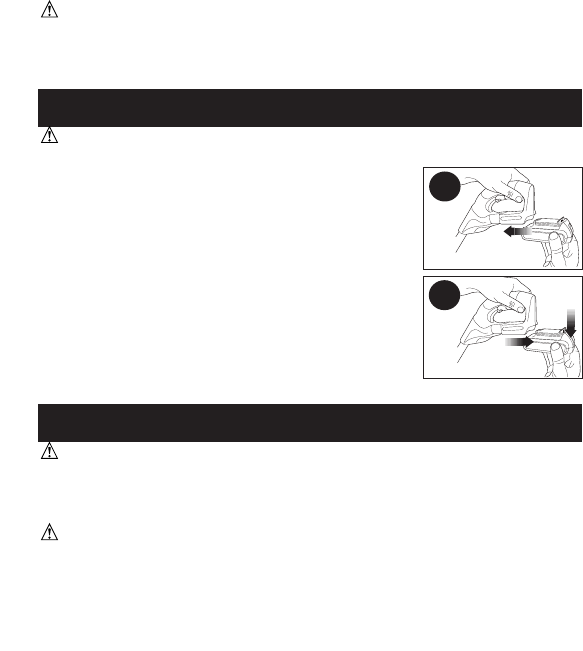
cavity. Unplug charger before attempting to clean.
6. Do not freeze or immerse charger in water or any other liquid.
WARNING: Shock hazard. Do not allow any liquid to get
inside charger. Never attempt to open the battery pack for any
reason. If the plastic housing of the battery pack breaks or cracks,
return to a service center for recycling.
INSTALLING / REMOVING BATTERY PACK
WARNING:
Make certain the lock-off button is engaged to
prevent switch actuation before removing or
installing battery.
TO INSTALL BATTERY PACK: Insert battery
pack into tool until an audible click is heard
(figure 1a).
TO REMOVE BATTERY PACK: Depress the
battery release button in the back of the battery
pack and pull battery pack out of tool
(figure 1b).
PREPARING YOUR POLE TRIMMER FOR USE
WARNING:
Read and understand all instructions. Failure to
follow all instructions listed below may result in electric shock, fire
and/or serious personal injury.
Installing and Removing Saw Chain
WARNING:
Sharp moving blade. To prevent accidental
operation, insure that battery is disconnected from the handle
before performing the following operations. Failure to do this
could result in serious personal injury.
life. The red LED flashes in the pattern indicated on the label when
the hot / cold pack delay is detected.
LEAVING THE BATTERY IN THE CHARGER
The charger and battery pack can be left connected with the green
LED glowing indefinitely. The charger will keep the battery pack
fresh and fully charged.
IMPORTANT CHARGING NOTES
1. Longest life and best performance can be obtained if the battery
pack is charged when the air temperature is between 60°F and 80°F
(16°- 27°C). DO NOT charge the battery pack in an air temperature
below +40°F (+4.5°C), or above +105°F (+40.5°C). This is important
and will prevent serious damage to the battery pack.
2. The charger and battery pack may become warm to touch while
charging. This is a normal condition, and does not indicate a
problem. To facilitate the cooling of the battery pack after use, avoid
placing the charger or battery pack in a warm environment such as
in a metal shed, or an uninsulated trailer.
3. If the battery pack does not charge properly:
a. Check current at receptacle by plugging in a lamp or other
appliance
b. Check to see if receptacle is connected to a light switch
which turns power off when you turn out the lights.
c. Move charger and battery pack to a location where the
surrounding air temperature is approximately 60°F and 80°F
(16°- 27°C)
d. If charging problems persist, take the tool, battery pack and
charger to your local service center.
4. The battery pack should be recharged when it fails to produce
sufficient power on jobs which were easily done previously. DO NOT
CONTINUE to use under these conditions. Follow the charging
procedure. You may also charge a partially used pack whenever
you desire with no adverse affect on the battery pack.
5. Foreign materials of a conductive nature such as, but not limited
to, steel wool, aluminum foil, or any buildup of metallic particles
should be kept away from charger cavities. Always unplug the
charger from the power supply when there is no battery pack in the
1a
1b
9


















